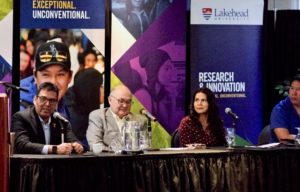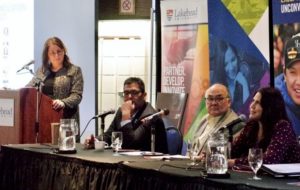‘Indigenous communities have a different approach to business,’ says Lakehead University student

By Rick Garrick
THUNDER BAY— Lakehead University’s Mar. 4 Business and Reconciliation: Educate, Reflect, Act panel discussion included a focus on how Indigenous businesses have evolved over the years. The panel was a co-event held by the Faculty of Business Administration, Work-Integrated Learning at Lakehead and Aboriginal Initiatives during Research and Innovation Week, which ran from Feb. 26-Mar. 5.
“With all due respect to the snowshoe makers and craftspeople, our businesses have a lot more to offer than just that,” says Jason Thompson, owner of Superior Strategies and a Red Rock Indian Band citizen. “We have to get by and past that thought — some of the directions I’ve been given by my business partners and folks I work with is we need to have ownership roles in a lot of these businesses that are surfacing in our communities.”
Thompson says Indigenous business people want to be on an even playing field with other businesses.
“My perspective on business has always been I’m not asking for a handout,” Thompson says. “I’m not asking for you to give me anything. Well maybe I am, what I’m asking for you to give me is an opportunity to demonstrate what I can do for you. I always use this analogy — I say: ‘You know what? All I want is an invite to the dance, and it’s up to me to dance.’”
Thompson adds that one of the premises behind the recent launch of his Warrior Work Wear line of clothing is to get past the stigma that First Nations people do not want to work.
“That’s not the case, in most cases it is a lack of understanding, it’s a lack of opportunity,” Thompson says. “And that’s really going to change the concept and language around what we are speaking of today — it’s giving people opportunity and a chance.”

The panel also included Aaron Kakepetum, a senior account manager First Nation Banking with the Royal Bank of Canada and Keewaywin citizen; Cheryl Ogima, a fourth-year Accounting major at Lakehead University and Enoch Cree Nation citizen; and Ed Hoshizaki, owner of Hoshizaki Development Consulting.
Denise Baxter, vice provost, Aboriginal Initiatives at Lakehead University and the panel moderator, says the panel discussion brought the Truth and Reconciliation Commission’s Call to Action number 92 on Business and Reconciliation to the forefront.
“So this was for some people a new conversation and it was raising awareness for them,” Baxter says. “For others, we had some people that were already embedded in this type of work, both on the panel and in the audience, so through a dialogue at the end we were able to collaborate on ideas to engage in reconciliatory business practices.”
Baxter says one of the interesting points she heard during the panel discussion was about the importance of engaging in business with Indigenous communities.
“When you engage in business with Indigenous communities, you’re really building long-term sustainable respectful trusting relationships with people,” Baxter says. “So the importance of that message was reiterated throughout all the speakers on the panel.”
Ogima noted during the panel discussion that Indigenous communities have a different approach to business.
“It’s really important that when businesses come and want to engage and partner with First Nations communities they look at the community as a whole because we are communal,” Ogima says. “For my reserve, most of our businesses are communal, so the reserve owns most of the businesses that are operated on-reserve, and our people are like stakeholders so they direct our board who are chief and council.”


